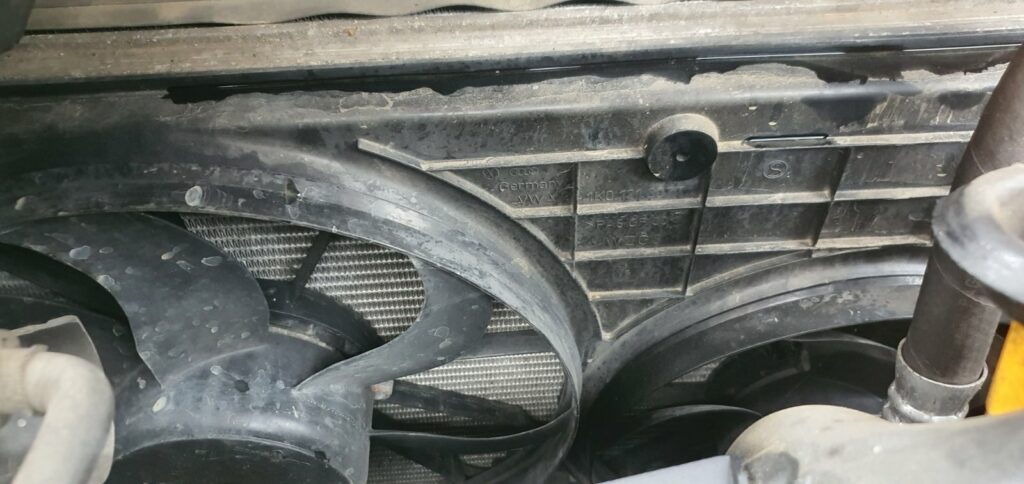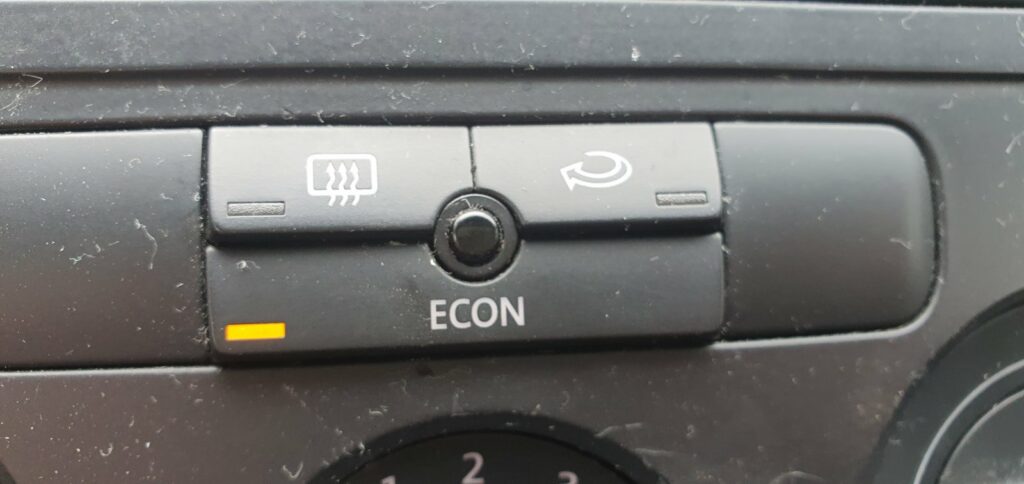If you’re hearing a loud noise coming from your air conditioner, it can be stressful and annoying. Luckily, there are some common reasons why a fan makes a loud noise when the AC is on.
It could be due to dust buildup, loose parts, age-related wear, and tear, or even design flaws in the system itself.
In this article, we look at seven of the most common causes of noise from air conditioners so you can figure out what’s wrong and how to fix it.
- Key Takeaway
- 7 Reasons Why a Fan Makes Loud Noise When AC Is On
- What Kinds of Noises Can a Car Air Conditioner Make?
- How To Fix a Noisy Car AC Fan
- Why You Should Not Neglect Car AC Noises?
- FAQs
- Q: What should I do if I hear a loud buzzing noise coming from my AC unit?
- Q: Why is my air conditioner making a pulsating noise?
- Q: What should I do if my AC is making a hissing noise?
- Q: Why is my air conditioner making a loud noise when it turns on?
- Q: What can cause a screeching noise from my AC?
- Q: What should I do if my air conditioner is making a clanking noise?
- Q: Why is my AC making a whirring noise?
- Q: What could be causing noise from inside my air conditioner?
- In Conclusion
Key Takeaway
- A fan makes a loud noise when the AC is on due to potential issues such as debris in the fan, a worn-out fan clutch, a faulty fan motor, loose or damaged belts, bent or damaged fan blades, low refrigerant levels, or a faulty compressor.
7 Reasons Why a Fan Makes Loud Noise When AC Is On

- Debris in the Fan
- Worn Out Fan Clutch
- Faulty Fan Motor
- Loose or Damaged Belts
- Bent or Damaged Fan Blades
- Low Refrigerant Levels
- Faulty Compressor
Debris in the Fan
This is one of the most common causes of a noisy car fan. Dirt, leaves, or other debris can get caught in the fan, causing it to make a loud noise when the AC is turned on. Regular cleaning and maintenance can help prevent this issue.
Worn Out Fan Clutch
The fan clutch allows the fan to operate at different speeds. If it’s worn out, it can cause the fan to run at high speed all the time, creating a loud noise. Replacing a worn-out fan clutch can resolve this problem.
Faulty Fan Motor
The motor that runs the fan could be failing, causing the fan to make a loud noise. If this is the case, the motor might need to be repaired or replaced.
Loose or Damaged Belts
If the belts that connect the fan to the engine are loose or damaged, they might cause a loud noise when the AC is on. Inspecting and replacing these belts as needed can help quiet the fan.
Bent or Damaged Fan Blades
If the blades on the fan are bent or damaged, they might cause a loud noise when they spin. It’s important to replace damaged fan blades to ensure optimal operation of the AC system.
Low Refrigerant Levels
Low refrigerant can cause the AC compressor to work harder, which can result in louder fan noise. Refilling the refrigerant to the appropriate level can resolve this issue.
Faulty Compressor
The compressor, which circulates the refrigerant through the AC system, might be faulty and cause the fan to be noisier than usual. This issue usually requires professional repair or replacement of the compressor.
What Kinds of Noises Can a Car Air Conditioner Make?

A car air conditioner can make a variety of noises, each indicating a different potential issue. Some common noises include:
- Buzzing or Vibrating: This can be due to a loose part or debris caught in the blower motor.
- Clicking or Ticking: These sounds often result from a failing or damaged compressor clutch.
- Hissing or Bubbling: This is usually a sign of a refrigerant leak.
- Squealing or Screeching: This typically indicates a belt issue, such as a worn-out serpentine belt.
- Rattling or Clanking: These noises could suggest there’s something loose in the AC system, such as a bolt or screw.
Each of these noises can indicate a different problem, so it’s important to pay attention and seek professional help if necessary.
How To Fix a Noisy Car AC Fan
- Identify the Noise: The first step is to identify the type of noise the fan is making. This can help you determine the possible cause of the problem.
- Check for Debris: Sometimes, debris can get stuck in the fan and cause noise. Check the fan for any visible debris and remove it if possible.
- Inspect the Fan Blades: Damaged or bent fan blades can cause noise. If you notice any damage, you may need to replace the fan.
- Check the Fan Motor: A faulty fan motor can also cause noise. If the motor is not functioning properly, it may need to be replaced.
- Inspect the Belts: Loose or damaged belts can cause a squealing noise. Check the belts for any signs of wear and tear and replace them if necessary.
- Examine the Clutch: A worn-out clutch can cause a clicking or ticking noise. If the clutch is worn out, it will need to be replaced.
- Check the Refrigerant Levels: Low refrigerant levels can cause a hissing noise. If the levels are low, you may need to add more refrigerant.
- Seek Professional Help: If you’re unable to identify or fix the problem yourself, it may be best to seek help from a professional mechanic. They will have the tools and expertise needed to diagnose and repair the issue.
Why You Should Not Neglect Car AC Noises?
- Potential for Larger Problems: Ignoring car AC noises could lead to more significant, costly repairs down the line if minor issues aren’t addressed promptly.
- Safety Concerns: Some noises could indicate serious problems that may affect the vehicle’s safety, such as issues with the electrical system or engine overheating.
- Comfort and Convenience: A fully functioning AC system is essential for maintaining a comfortable and pleasant driving environment, especially in hot weather.
- Vehicle Value: Keeping all parts of your car, including the AC system, in good working order can help maintain the car’s overall value.
- Fuel Efficiency: Some AC issues can cause the car to work harder, decreasing its fuel efficiency.
- Avoiding Breakdowns: Addressing noises promptly can prevent unexpected breakdowns or system failures while you’re on the road.
FAQs
Q: What should I do if I hear a loud buzzing noise coming from my AC unit?
A: If you hear a loud buzzing noise coming from your AC unit, it could indicate an issue with the fan motor or a problem with the air filter. It is recommended to call a professional to diagnose and fix the problem.
Q: Why is my air conditioner making a pulsating noise?
A: A pulsating noise coming from your air conditioner could be due to an issue with the fan motor. It is best to have a professional inspect and repair the unit.
Q: What should I do if my AC is making a hissing noise?
A: A hissing noise from your air conditioner can indicate a refrigerant leak. It is important to turn off the AC and call a professional to address the issue.
Q: Why is my air conditioner making a loud noise when it turns on?
A: When your air conditioner turns on, it may make a loud noise due to various reasons, such as a loose fan motor or dirty fan blades. It is recommended to have a professional inspect and service your AC unit.
Q: What can cause a screeching noise from my AC?
A: A screeching noise from your AC can be caused by a worn-out fan belt or a problem with the AC compressor. It is best to have a professional technician diagnose and repair the issue.
Q: What should I do if my air conditioner is making a clanking noise?
A: If your air conditioner is making a clanking noise, it could be due to loose or damaged fan blades. It is recommended to have a professional inspect and repair the unit.
Q: Why is my AC making a whirring noise?
A: A whirring noise from your AC can indicate a problem with the fan motor or the fan blades. It is best to have a professional technician investigate and resolve the issue.
Q: What could be causing noise from inside my air conditioner?
A: Noise from inside your air conditioner can be caused by various factors, such as loose components, a malfunctioning fan motor, or a dirty air filter. It is advisable to schedule a service appointment with a professional technician.
In Conclusion
The loud noise made by a fan when the AC is on can be caused by several things.
It could be due to bearings that are worn out, a bent or loose blade, motor overload or misalignment, or even something as simple as dust and dirt buildup in the air ducts.
No matter what the cause of the noise, it should not be ignored.
